On the blue banks of the Ganges
- May 15, 2022
- 7 min read
Welcome to Rishikesh, both a sacred city and a sacred starting point for unplugging, disconnecting, having fun and, above all, for cultural, emotional and spiritual rejuvenation.

For a yoga teacher in love with India, going to Rishikesh is a must, a kind of pilgrimage in the footsteps of the ancient yogi who once withdrew into the silence of the Himalayan caves surrounding the town, or of Shiva, one of the three most revered deities of Hinduism, also known as the Adiyogi, the first Yogi, father of yoga and the arts.
After 3 stays in this wonderful country, I couldn't start my solo adventure in Asia any other way and so I chose to do a 200h TTC in Hatha Yoga at the Tattva Yogashala school
What is a ttc ?
In yogic jargon, this is teacher training. But you are already a yoga teacher, you might ask? Yes, but I still have so much to learn and yoga has so much to teach me about myself. A yogini remains an eternal student in the face of the infinite field of knowledge covered by yoga and a lifetime will not suffice. Moreover, to experience a training in India, in Rishikesh, the world capital of yoga, seemed to me to be the ideal initiation to my new itinerant life. To be in a bubble without having to think about anything for a month, to purify my body and my mind to somehow reset myself. Well I was not disappointed, the immersion was total, very intense and rich in exchanges, learning and improvement with my generous and soothing teachers who were Anup ji for the practice of Hatha, Upendra ji for kriyas, pranayama and meditation and Sunil Sharma ji in Yoga nidra, philosophy and psychology of yoga. First class since the closing due to Covid, we were a small group of 8 students of 7 different nationalities. The oldest and only teacher of this joyful team, we were like a family, living, eating and studying together from 6am to 9pm during 25 days of joy, sometimes sorrow, challenges, fatigue, sharing, mutual aid, tourista, strong emotional moments... And when the final ceremony comes, the graduation and the eminence of the separation, the eyes moisten, the hearts tighten and the bodies embrace. It's hard to leave this small community of students and teachers and get back on the road, but I know that I have new friends to visit all over the world. The magic of travel has once again woven its web, forged bonds and enriched souls.
So what, Rishikesh?
I mainly made the most of the three days before the start of the course. It's not enough time to discover all the sights of the city, but it's more than enough time to explore, wander around and soak up the atmosphere. In India, adventure is often closer than you think if you have an open mind and have left your fears at home. My meeting with Raj, the only macramé jewellery seller in the area, is the perfect illustration. Sitting on the floor, his sister's jewellery on a sheet, the poor guy has certainly not sold anything for a long time. We talk about our lives, about jewellery, I show him my creations while sipping chaïs and an indeterminate time later, he abandons his sad business to take me in the jungle to meet two babas. The scooter sometimes struggles to climb the narrow, winding cement track that actually climbs into the forest and I tell myself, as I always do in this kind of situation, that I'm sometimes a little oblivious but isn't that the price to pay for a little adventure today. We pass elephant dung and a few monkeys, cucumber and drink stalls in totally improbable places to arrive at the famous camp of the two baba rastas, the guru and his young disciple. Sitting on a concrete slab with visitors, dressed in a simple cloth around the waist and the rastas wrapped in a turban, the guru greets me with a namaste and allows me to visit the cave near a small stream. Always uncomfortable with this kind of intrusion, I let myself be guided by Raj, a regular visitor. I quickly understand that he does not come here to meditate or pray but to share j
oints with the disciple in exchange for some gifts of milk or fruit. The exchanges are complicated, Raj acts as a translator and I learn that a few nights ago a herd of ten elephants invited themselves into the camp and that sometimes one can come across a leopard or a tiger. This is not surprising, we are in the heart of the Rajaji National Park. It is for this reason that during my stay, through the window of the shala where I used to practice twice a day, I had the great privilege to witness the moving encounter of a pair of hornbills, birds with impressive beaks whose pair, once formed, remains faithful for life.
At only 350 metres above sea level, the holy city, which according to my friend Manish would also be the city of Love, is indeed surrounded by forest and it is true that one does not only come across pairs of hornbills or black-headed grey langurs, but also many lovers embracing or holding hands, which is a rare occurrence in India as unmarried couplings are still frowned upon Translated with www.DeepL.com/Translator (free version).

As one of the country's most sacred and spiritual centres for thousands of years, crowds of tourists and pilgrims flock to the narrow streets on the blue banks of the Ganges on weekends and holidays.
crowds of tourists and pilgrims flock to the narrow lanes on the blue banks of the Ganges on weekends and holidays. They mingle with the fake orange-clad sadhus begging all over the place, the cows searching for food on the hot asphalt and the stray dogs sleeping nonchalantly here and there. I meet very few western tourists looking for spirituality in this post-covid period and many shops, restaurants and yoga schools are still closed or trying to survive after 2 years of plague which have put a strain on the flourishing ayurveda and yoga business. The Indians have not lost their smile, their benevolence and it is with a look as bright as ever that they greet me in the street, curious to know where I come from, to exchange a few words or to take a selfie. You quickly think you are a star if you are not careful!
In the cacophony of the horns, driving or rather zigzagging on both sides of the river or crossing the two narrow pedestrian bridges (Ram Jhula and Lakshman Jhula), requires a certain vigilance to avoid dung, especially in flip-flops, and not to be hit by scooters which have a clear tendency to believe they are the masters of the place. Not to mention the macaque monkeys posted on the cables of the old bridges inherited from the English, who are on the lookout to steal anything within their reach. An improbable and colourful melting pot, a gentle chaos vibrating with life, a great bazaar where the smells of incense and street food, chanted mantras, prayers and tinkling bells, devotion and fervour mingle, because in India everything is a question of religion. Every evening at sunset, believers crowd the ghats to attend the Aarti, a ceremony of light which honours the river, considered as a mother, the goddess Ganga.
The devotion to this river is just incredible and bathing in its cool waters during our break was each time a pure moment of delight and relaxation in the intense heat of April. Caution is still required as the powerful current carries away a large number of believers every year who generally do not know how to swim. Besides, on the ghats, the devotees proceed to their ablutions, hanging on a chain to avoid being swept away. On the beaches, the iridescent grey sand, almost white, is sumptuously soft but so hot at this time of year that only cows can lie on it.
Devotees flock from all over the country to soak in the waters of the "mother river", which are said to be able to heal and purify those who immerse themselves in it, freeing them from the cycle of reincarnations. Is this a belief? In fact, scientific studies have demonstrated the magical virtues of the waters of the Ganges. Dr Krishna Khairnar, a virologist at the National Institute for Environmental Research (Neeri), has confronted beliefs with scientific reality and the samples taken confirm that the famous purity of the Ganges is not just a myth. Its waters know how to regenerate themselves, thanks to their richness in bacteriophages, and it is this self-cleaning power that enables them to overcome microbes such as those of cholera. Thus a glass filled with water from the Ganges remains free of any sign of putrefaction, even after several years, which does not prevent the river from being extremely polluted and dying slowly. But Rishikesh is upstream, close to the source, the blue water is still clean and many pilgrims take it home to drink it and benefit from its unique curative virtues. Another mysterious and still unexplained property is the record rate of oxygenation of its waters. Many come to soak in the water religiously, but also to go rafting, a popular activity, as well as swimming in the surrounding waterfalls, which are unfortunately littered with litter and plastic waste, a major scourge in India due to the lack of education and public rubbish collection services. Translated with www.DeepL.com/Translator (free version)
See you soon Rishikesh...
I left Rishikesh and India with regrets but I only had a one month visa. Absorbed by the courses and sometimes too tired or sick to take advantage of our rare free time, I didn't have enough time to explore as much as I would have liked and discover all the corners of the city. I would come back, no doubt, I now know the way to Rishikesh which deserves to be lived and savoured as it should be by letting time get lost and encounters be made, instantaneous, ephemeral or lasting because they always leave memorable memories. I knew that the frantic pace of the TTC would not allow me these beloved moments when I sit down, chat, share a chai, when I offer myself this precious gift, the time to live and be shanti shanti.
I am writing these lines from Negombo, a Christian enclave 39 km from Colombo in Sri Lanka, but I will tell you all about it in a future post. I hope to have made you travel with me and if you want to continue the journey, subscribe to my newsletter or my facebook page.
One of my favourite quotes "My favourite pastime is letting time pass, having time, taking my time, wasting my time, living against time." F. Sagan








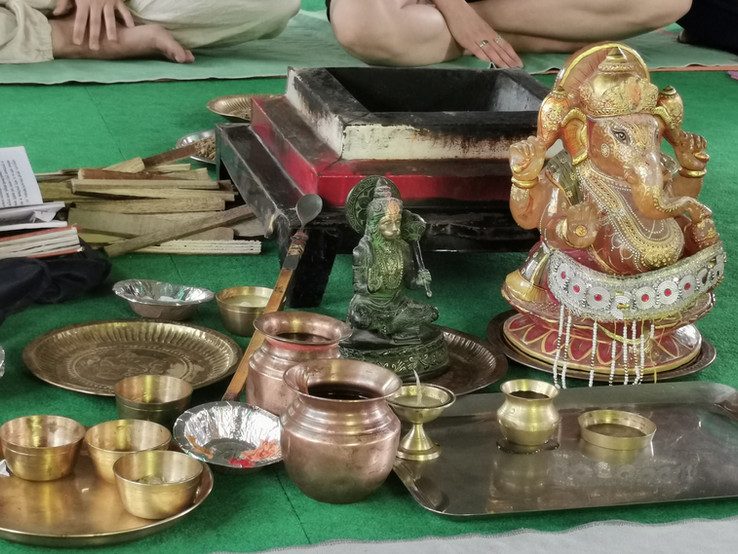





















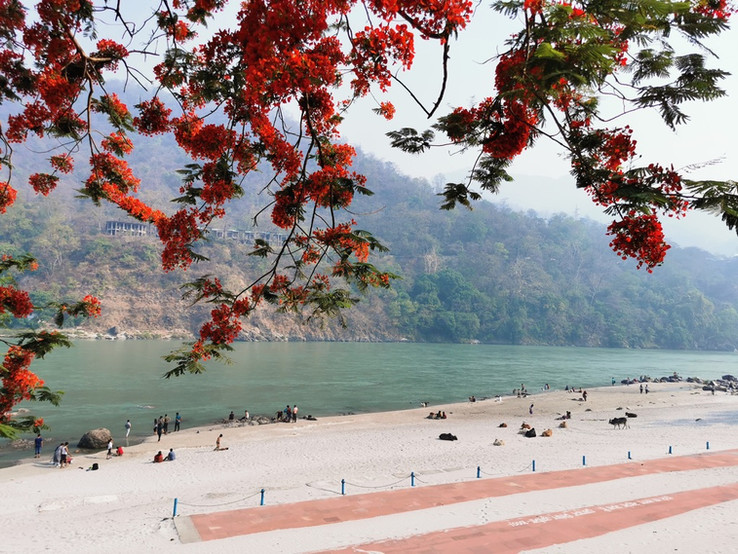





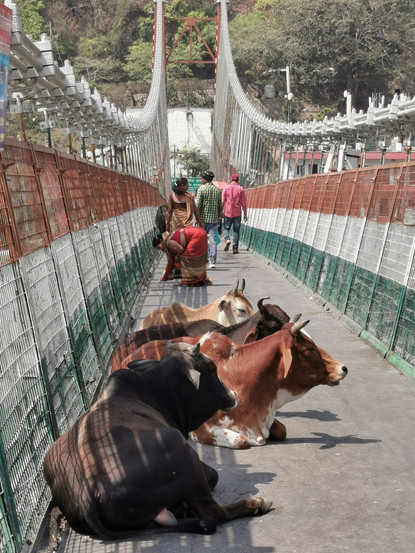



















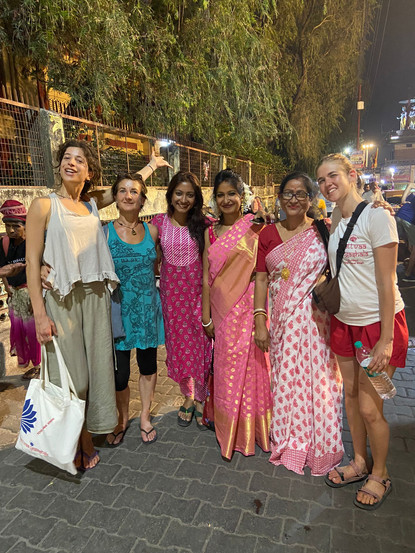

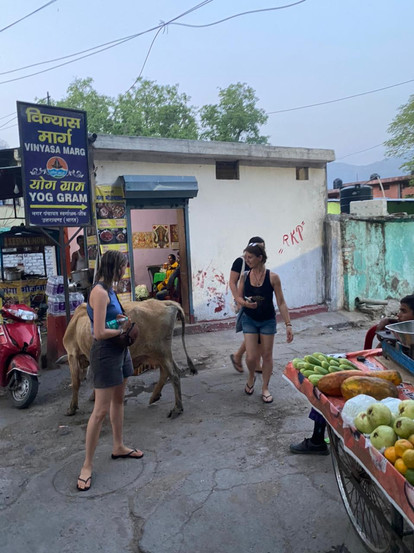





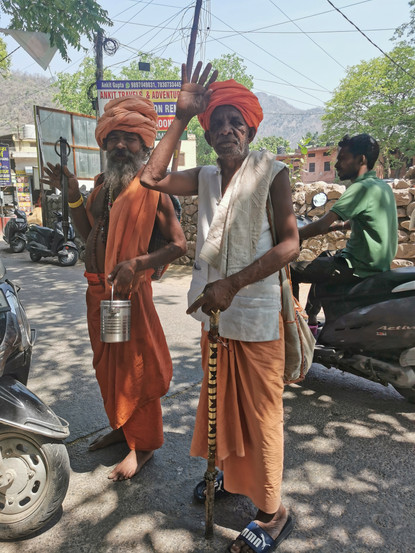









Comments